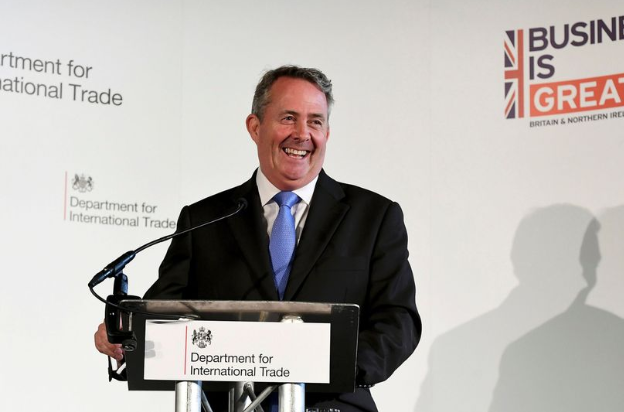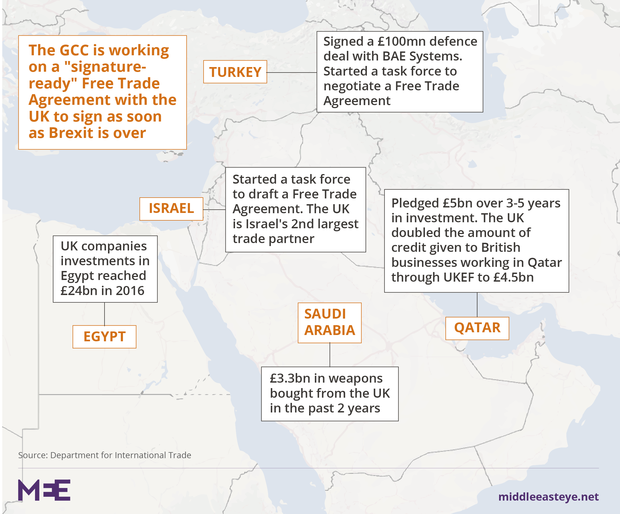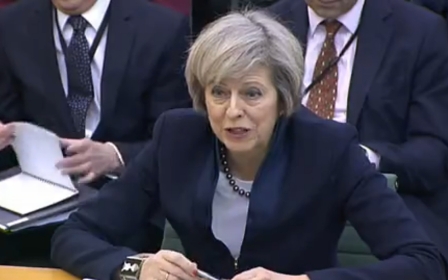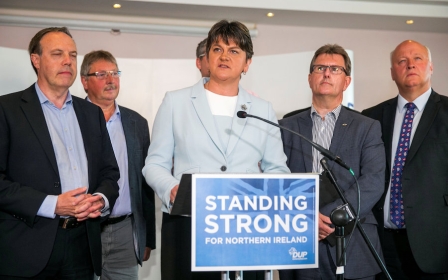UK agrees its first post-Brexit trade deal 'in principle' with Israel

Britain has agreed "in principle" to make its first post-Brexit free trade deal with Israel, as pressure mounts on the UK government to not leave the European Union without a deal with Europe.
Speaking on the sidelines of the Davos conference in Switzerland, the UK's Secretary for International Trade Liam Fox announced the trade deal with his Israeli counterpart Eli Cohen.
"I'm delighted that as Britain prepares to leave the European Union and to ensure continuity for our businesses in both directions, we've reached agreement in principle today with our colleagues in Israel," Fox said, as he stood alongside Cohen.
"Israel has been one of the most cooperative and productive partners in this relationship where our trade is already strong and set to go further.
"For us, the continuity as we leave the European Union will be a precursor to an even more ambitious agreement in the future."
Cohen added to Fox's statement, where he said that trade with Britain had broken the £10 billion mark last year, and hoped the proposed free trade agreement would strengthen British ties with Israel.
Fox's announcement comes as pressure mounts on the minister to find more trade deals as Britain looks increasingly set for a "no-deal" exit from the European Union.
It remains unclear what the newly negotiated trade deal would entail.
Representatives from Britain's International Trade office told Middle East Eye the new trade deal is part of a series of continuity agreements Britain hopes to sign in the coming weeks, and based on existing agreement the European Union has with Israel.
Fox told the BBC on Wednesday that he will be signing deals with a series of other countries in preparation for Britain's exit from the EU.
The UK, however, is unable to sign new trade agreements until they leave the European Union.
Nick Dearden, director of the campaign group Global Justice Now, told Middle East Eye that Britain's post-Brexit trade deals were likely to be with countries with poor human rights records.
"Britain’s unseemly search for post-Brexit trade deals is bad news for human rights the world over. Liam Fox has been talking to Israel for some time, not to mention Saudi Arabia, Bahrain, the Philippines, Turkey and now Brazil, all currently presided over by repressive regimes. For those fighting against this repression this is grim news, because it likely means more arms sales, and more legitimisation of those bloody regimes."
Dearden added that there is a "long-running campaign to suspend the EU-Israel trade deal because Israel is blatantly using it to trade goods produced on occupied land. Instead of taking the opportunity to question it, Britain is desperate to sign up to it post-Brexit, and worse still, to expand trade and sign a deeper trade deal, which Liam Fox has been secretly discussing with the Israeli government for well over a year."
Britain is Israel’s second largest trade partner after the United States, and the two countries enjoy a long relationship, especially in the defence and security sector.
On the same day that UK Prime Minister Theresa May officially triggered Brexit, British cabinet ministers chaired the first meeting of the new UK-Israel trade working group.
The group was created in February following a visit by Israeli Prime Minister Benjamin Netanyahu.
New MEE newsletter: Jerusalem Dispatch
Sign up to get the latest insights and analysis on Israel-Palestine, alongside Turkey Unpacked and other MEE newsletters
Middle East Eye delivers independent and unrivalled coverage and analysis of the Middle East, North Africa and beyond. To learn more about republishing this content and the associated fees, please fill out this form. More about MEE can be found here.





